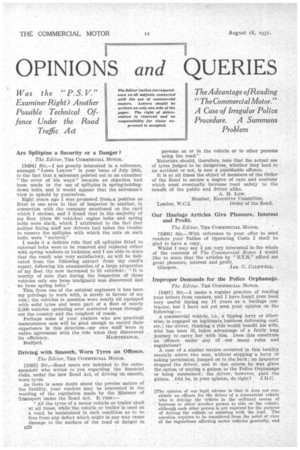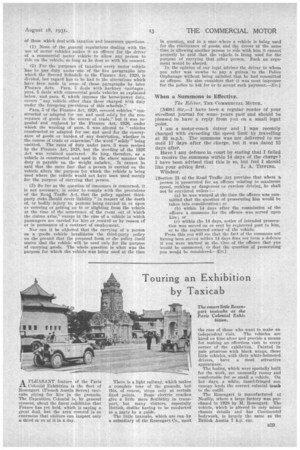OPINIONS and QUERIES Are Splitpins a Security or a Danger ?
Page 42

Page 43

If you've noticed an error in this article please click here to report it so we can fix it.
The Editor, THE COMMERCIAL MOTOR.
[3494] Sir,—.I am greatly interested in a reference, amongst "Loose Leaves" in your issue of July 28th, to the fact that a salesman pointed out to an examiner "the error of his ways" because an objection had been made to the use of splitpins in spring-holdingdown bolts, and it would appear that the salesman's view is upheld by yourselves.
Eight years ago I was promoted frcema position as fitter in one area to that of inspector in another, in connection with the company mentioned on the card which I enclose, and I found that iii the majority of my fleet (then 60 vehicles) engine bolts and spring bolts were slack, which I attributed to the fact that neither fitting staff nor drivers had taken the trouble to remove the splitpins with which the nuts on such bolts were "secured."
I made it a definite rule that all splitpins fitted to external bolts were to be removed and replaced either with spring washers or locknuts, and I am able to state that the result was very satisfactory, as will be indicated from the following extract from my chief's report, following his examination of a large proportion of my fleet (by now increased to 85 vehicles): "It is worthy of note that during the inspection of these vehicles only one loose mudguard was discovered and no loose spring bolts."
This, from one of the astutest engineers it has been my privilege to work with, is surely in favour of my rule ; the vehicles in question were nearly all equipped with solid tyres and were part of a fleet of nearly 2,000 vehicles operating over scattered areas throughout the country and the roughest of roads.
Perhaps some of your readers who are practical maintenance men will be good enough to record their experience in this direction—my own staff were in entire agreement with the rule when they discovered its efficiency. MAINTENANCE. Bedfprd.
Driving with Smooth, Worn Tyres an Offence. The Editor, THE COMMERCIAL MOTOR.
[3495] Sir,—Road users are indebted to the correspondent who writes to you regarding the financial risks, under the new Road Act, of driving on smooth,
• worn tyres. As there is some doubt about the precise nature of the liability, Your readers may be interested in the wording of the regulation made by the Minister of Transport under the Road Act. It runs:— " All the tyres of a motor vehicle or trailer shall at all times, while the vehicle or trailer is used on a road, be maintained in such condition as to be free from any defect which might in any way cause damage to the surface of the road or danger to )328 persons on or in the vehicle or to other persons using the road."
Motorists should, therefore, note that the actual use of tyres judged to be dangerous, whether they lead to an accident or not, is now a punishable offence.
It is at all times the object of members of the Order of the Road to secure a degree of care and courtesy which must eventually increase road safety to the benefit of the public and driver alike.
A. M. Low.
Member, Executive Committee, London, W.C.2. Order of the Road.
Our Haulage Articles Give Pleasure, Interest and Profit.
The Editor, THE COMMERCIAL MOTOR.
[3496] •Sir,—With reference to your offer to send readers your Tables of Operating Costs I shall be glad to have a copy.
Whilst I may say I am very interested in the whole
• of the contents of The Commercial Motor I would ,like to state that the articles by " S.T.R." afford me great pleasure, interest and profit.
Glasgow. JAS. C. CALDWELL.
Improper Demands for the Police Orphanage. The Editor, THE COMMERCIAL MOTOR.
[3497] Sir,—I make a regular practice of reading your letters from readers, and I have found your book very useful during my 11 years as a haulage contractor, but I have not yet seen your opinion on the following:—
A commercial vehicle, i.e., a tipping lorry or otherwise, is engaged on legitiinate business delivering coal, etc.; the driver, thinking a ride would benefit his wife, Who has been ill, takes advantage of a fairly long journey to carry her with him. Does this constitute an offence under any of our many rules and regulations?
A ease of a similar nature occurred in this locality recently where two men, without stopping a lorry or asking permission, jumped on to the hack ; an inspector stopped the driver, and in due course he was given the option, of -paying a guinea to the Police Orphanage or being summoned ; the driver, however, paid the guinea. Did he, in your opinion, do right? J.H.C.
[The opinion of our legal adviser is that it does not constitute an offence for the driver of a commercial vehicle who is driving the vehicle in the ordinary course of business to allow another person to ride on the vehicle, , although such other person is not required for the purpose of driving the vehicle or assisting with the load. The question requires to be considered. from the point of view of the regulations affecting motor vehicles generally, and of those which deal with taxation and insurance questions.
(1) None of the general regulations dealing with the use of motor vehicles makes it an offence for the driver of a commercial motor vehicle to allow any person to ride on the vehicle, so long as he does so with his consent.
• (2) For the purposes of taxation every motor vehicle has to pay duty under one of the five paragraphs into which the Second Sehedule to the Finance Act, 1920. is divided, but regard has to be had to the alterations which have been made in some of those paragraphs by later Finance Acts. Para. 3 deals with hackney carriages; para. 5 deals with commercial goods vehicles as explained below, and para. 6, which imposes the horse-power duty, covers " any vehicle other than those charged with duty under the foregoing provisions of this schedule."
Para. 5 of the Finance Act, 1920, covered vehicles "constructed or adapted for use and used solely for the conveyance of goods in the course of trade," hat it was repealed and replaced by the Finance Act, 1926, under which the wording of para. 5 was altered to "vehicles constructed or adapted for use and used for the conveyance of goods or burden of any description, whether in the course of trade or otherwise," the word "solely" being omitted. The rates of duty under para. 5 were revised by the Finance Act, 1928, but the wording of the 1926 Act was retained unaltered. So long, therefore, as a vehicle is constructed and used in the above manner the duty is payable on the weight unladen. It cannot be said that the mere fact that a person is carried on the vehicle alters the purpose for which the vehicle is being used where the vehicle would not have been used merely for the purpose of carrying that person.
(3) So far as the question of insurance is concerned, it is not necessary, in order to comply with the provisions of the Road Traffic Act, that the policy against thirdparty risks Ahould cover liability "in respect of the death of, or bodily injury to, persons being carried in or upon or entering or getting on to or alighting from the vehicle at the time of the occurrence of the event out of which the claims arise," except in the case of a vehicle in which passengers are carried for hire or reward or by reason of or in pursuance of a contract of employment.
Nor can it be objected that the carrying of a person on a goods vehicle invalidates the third-party policy on the ground that the proposal form or the policy itself states that the vehicle will be need only for the purpose of carrying goods. The whole question is what was the purpose for which the vehicle was being used at the time in question, and in a case where a vehicle is being used for the cohWyance of goods, and the driver at the same time is allowing another person to ride with him it cannot properly be said that the vehicle is being used for the purpose of carrying that ,other person. Such an argument would be absurd:
in the opinion of our legal adviser the driver to whom you refer was unwise to pay .a 'guinea 'to the Police Orphanage without being satisfied that he had committed an offence. Re also considers that it was most improper for the police to ask for or to accept such payment.—Em] When a. Summons is Effective.
The Editor, TEE 'COMMERCIAL MOTOR.
[34981 Sir,—I have been a regular. reader of your excellent journal for some years past and should be pleased to have a reply from you on a small legal point.
I am a motor-coach driver and I was recently charged with exceeding the speed limit by _travelling at 33 m.p.h.. The summons was not delivered to. me until 17 days after the charge, but it was dated 15 days after.
Have I any defence in court by stating that I failed to receive the summons within 14 days of the charge? I have been advised that this is so, but feel I should like your advice first. L. A. TippiNct. Windsor.
[Section 21 of the Road Traffic Act provides that where a person is prosecuted for an offence relating to maximum speed, reckless or dangerous or careless driving, he shall not be convicted unless
(a) he was warned at the time the offence was committed that the question of prosecuting him would be taken into consideration ; or (b) within 14 days after the commission of the offence a summons for the offence was served upon him; or
(c). within the 14 days, notice of intended prosecution was served on or sent by registered post to him, or to the registered owner of the vehicle.
Front this you will see that the fact of the summons not having been served within 14 days does not form a defence if you were warned at the time of the offence that you would be summoned, or that the question of prosecuting you would be considered.—En.1




























































































